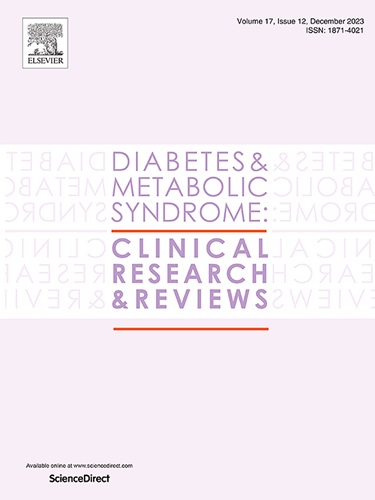补充亚麻籽对糖尿病患者的人体测量指标、血压和血脂的影响:一项随机对照试验的grade评估系统评价和荟萃分析
IF 3.4
Q1 ENDOCRINOLOGY & METABOLISM
Diabetes & Metabolic Syndrome-Clinical Research & Reviews
Pub Date : 2025-05-01
DOI:10.1016/j.dsx.2025.103241
引用次数: 0
摘要
背景和目的大量临床研究表明,亚麻籽补充剂可能对糖尿病患者有效,但研究结果存在争议。因此,本研究旨在探讨亚麻籽对糖尿病患者血压、人体测量和血脂参数的影响。方法截至2024年6月检索spubmed、Cochrane Library、Web of Science、Scopus、Embase和谷歌Scholar数据库。采用随机效应模型分析标准化平均差异(SMDs)。结果对16项试验1136名受试者的荟萃分析显示体重有显著改善(SMD: 0.81;95% CI: 1.54 ~ - 0.09, p = 0.028;I2 = 88.7%, p <;0.001),腰围(SMD: 1.54;95% CI: 2.77 ~ - 0.31, p = 0.002;I2 = 85.3%, p <;0.001),甘油三酯(SMD: 0.56;95% CI: 1.02 ~ - 0.10, p = 0.016;I2 = 87.4%, p <;0.001),但BMI没有(SMD: 0.63;95% CI: 1.28 ~ 0.02, p = 0.058;I2 = 87.9%, p = 0.005),收缩压(SMD: 0.50;95% CI: 1.25, 0.25, p = 0.193;I2 = 87.6%, p <;0.001),舒张压(SMD: 0.74;95% CI: 1.51, 0.03, p = 0.060;I2 = 88.1%, p <;0.001)、总胆固醇(SMD: 0.43;95% CI: 0.99 ~ 0.12, p = 0.128;I2 = 93.6%, p <;0.001),低密度脂蛋白胆固醇(SMD: 0.09;95% CI: 0.87 ~ 0.70, p = 0.830;I2 = 96.3%, p <;0.001),高密度脂蛋白胆固醇(SMD: 0.08;95% CI: 0.30 ~ 0.46, p = 0.673;I2 = 87.2%, p <;0.001)。结论补充亚麻籽可有效降低2型糖尿病患者的人体测量指数和甘油三酯水平,但对血压和其他血脂参数没有任何益处。因此,进行更广泛、设计良好的试验来验证这些发现是至关重要的。本文章由计算机程序翻译,如有差异,请以英文原文为准。
The effect of flaxseed supplementation on anthropometric indices, blood pressure, and lipid profile in diabetic patients: A GRADE-assessed systematic review and meta-analysis of randomized controlled trials
Background and aims
Numerous clinical studies have suggested that flaxseed supplementation may be effective in diabetic patients, but the findings are controversial. Therefore, this study aimed to examine the effects of flaxseed on blood pressure, anthropometry, and lipid profile parameters in diabetic patients.
Methods
PubMed, Cochrane Library, Web of Science, Scopus, Embase databases, and Google Scholar were searched until June 2024. A random-effects model was utilized to analyze standardized mean differences (SMDs).
Results
Meta-analysis of 16 trials with 1136 participants indicated significant improvements in weight (SMD: 0.81; 95 % CI: 1.54 to −0.09, p = 0.028; I2 = 88.7 %, p < 0.001), waist circumference (SMD: 1.54; 95 % CI: 2.77 to −0.31, p = 0.002; I2 = 85.3 %, p < 0.001), and triglyceride (SMD: 0.56; 95 % CI: 1.02 to −0.10, p = 0.016; I2 = 87.4 %, p < 0.001), but not BMI (SMD: 0.63; 95 % CI: 1.28 to 0.02, p = 0.058; I2 = 87.9 %, p = 0.005), systolic blood pressure (SMD: 0.50; 95 % CI: 1.25, 0.25, p = 0.193; I2 = 87.6 %, p < 0.001), diastolic blood pressure (SMD: 0.74; 95 % CI: 1.51, 0.03, p = 0.060; I2 = 88.1 %, p < 0.001), total cholesterol (SMD: 0.43; 95 % CI: 0.99 to 0.12, p = 0.128; I2 = 93.6 %, p < 0.001), low-density lipoprotein cholesterol (SMD: 0.09; 95 % CI: 0.87 to 0.70, p = 0.830; I2 = 96.3 %, p < 0.001), and high-density lipoprotein cholesterol (SMD: 0.08; 95 % CI: 0.30 to 0.46, p = 0.673; I2 = 87.2 %, p < 0.001).
Conclusion
Flaxseed supplementation effectively reduces anthropometric indices and triglyceride levels in individuals with type 2 diabetes but does not suggest any benefit on blood pressure and other lipid profile parameters. Therefore, conducting more extensive, well-designed trials to validate these findings is crucial.
求助全文
通过发布文献求助,成功后即可免费获取论文全文。
去求助
来源期刊

Diabetes & Metabolic Syndrome-Clinical Research & Reviews
ENDOCRINOLOGY & METABOLISM-
CiteScore
22.90
自引率
2.00%
发文量
248
审稿时长
51 days
期刊介绍:
Diabetes and Metabolic Syndrome: Clinical Research and Reviews is the official journal of DiabetesIndia. It aims to provide a global platform for healthcare professionals, diabetes educators, and other stakeholders to submit their research on diabetes care.
Types of Publications:
Diabetes and Metabolic Syndrome: Clinical Research and Reviews publishes peer-reviewed original articles, reviews, short communications, case reports, letters to the Editor, and expert comments. Reviews and mini-reviews are particularly welcomed for areas within endocrinology undergoing rapid changes.
 求助内容:
求助内容: 应助结果提醒方式:
应助结果提醒方式:


